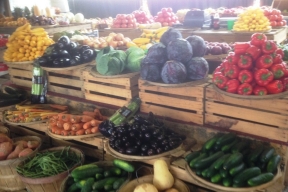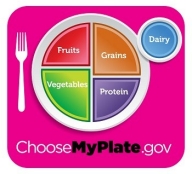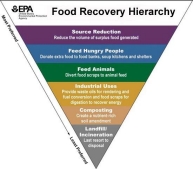Healthy Places - Food and Nutrition
Healthy food is important for wellness. Whether people have access to food is determined by production, distribution, sustainability and affordability. Together these factors determine food security. Some communities have limited access to healthy and affordable foods. This is often due to a lack of grocery stores, farmers markets and healthy food retailers. Fresh fruit, vegetables, herbs and other healthful whole foods can be difficult to find in communities already suffering from other health inequities. For some people buying nutritious foods may be too expensive to maintain a healthy diet. Communities where healthier foods are available and affordable tend to have healthier residents, economic prosperity, job opportunities and higher property values.

Why is food and nutrition important for health?
What are schools doing to promote health?
What about breastfeeding infants?
Why nutrition important for older people?
What is a food desert?
What are farmers markets?
What is urban gardening?
What resources are available to feed the hungry?
What is sustainable management of food?
What is food security?
Government partners
Additional resources

Healthy eating and regular physical activity can help prevent heart disease, obesity, diabetes, cancer and other chronic diseases. A healthy diet is important for childhood development through staying active as a senior. Healthy eating is influenced by many factors, including stage of life, situations, preferences, access to food, culture, traditions and personal decisions. MyPlate offers ideas and tips to help you create a healthier eating style that meets your individual needs and improves your health. For more information about healthy eating visit ChooseMyPlate.gov.
The Centers for Disease Control and Prevention’s (CDC) Healthy Food Environments webpage has suggestions for healthier food choices for child care, schools, hospitals, worksites, restaurants and communities.
What are schools doing to promote health?

Schools influence the dietary and physical activity behaviors of children and adolescents. The health of students is linked to their academic success. Schools can support healthy eating and regular physical activity by providing opportunities for students to learn about and practice these behaviors.
The Department of Education’s Tennessee School Nutrition Program is responsible for proving nutritious meals and snacks for students in public and private schools, as well as residential and child care institutions. Nutrition standards require most schools to increase the availability of fruits, vegetables, whole grains and fat-free and low-fat fluid milk in school meals; reduce the levels of sodium, saturated fat and trans fat in meals; and meet the nutrition needs of school children within their calorie requirements. For a detailed description of these federal requirements, see the Nutrition Standards in the National School Lunch and School Breakfast Programs . All public schools in Tennessee are on the National School Lunch Program, which provides nutritionally balanced, low-cost or free lunches to children each school day.
CDC combined research and best practices into MMWR: School Health Guidelines to Promote Healthy Eating and Physical Activity. Nine guidelines, each with a set of implementation strategies, help schools develop, implement and evaluate school-based healthy eating and physical activity policies and practices for students. CDC’s Vitalsigns are great infographics and ideas about how to get kids to eat more fruits and vegetables at child care and schools.
What about breastfeeding infants?
Feeding natural mother’s milk provides health benefits to mother and baby. According to CDC’s website a woman's ability to initiate and sustain breastfeeding is influenced by a host of factors, including the community in which she lives. A woman's community has many components, such as public health and other community-based programs, coalitions and organizations, schools and child care centers, businesses and industry, and the media. The extent to which each of these entities supports or discourages breastfeeding can be crucial to a success in breastfeeding. The Surgeon General’s Call to Action to Support Breastfeeding has a helpful factsheet about How Communities Can Help support mothers who want to breastfeed.
Why is nutrition important for older people?
Many health issues associated with aging can be controlled and delayed by eating healthier. Adults over the age of 50 have different dietary needs from those of younger adults. Diet-related disease is a major issue for older adults and can cause or intensify many chronic conditions. Based on Federal Government dietary guidelines, What's On Your Plate? Smart Food Choices for Healthy Aging (PDF, 5.7M) provides healthy eating information for older adults. The Tennessee Department of Health receives grants from the U.S. Department of Agriculture to operate the Farmers Market Nutrition Program (FMNP). This program is offered in Tennessee in July and August. The FMNP provides locally grown fruits, vegetables and herbs to families with limited resources and is available to seniors in designated counties. The Tennessee Commission on Aging and Disability’s Nutrition Services can help older Tennesseans access nutritionally-balanced meals to support their health.
What is a food desert?
A food desert describes a community with limited access to healthy and affordable foods. This is often due to a lack of grocery stores, farmers' markets and healthy food retailers. Fresh fruit, vegetables, herbs and other healthful whole foods, can be difficult to find in communities already suffering from other health inequities. For some people buying nutritious foods may be too expensive to maintain a healthy diet.
This has become a health problem because while food deserts are often short on whole food providers and are instead heavy on local quickie marts that provide a wealth of processed, sugar and fat laden foods. The USDA has mapping tool called the Food Access Research Atlas. It presents a spatial over of food access indictors.
What about farmers markets?
Farmers have been working the land to grow crops for many years. There are renewed movements to connect people with farming. In many communities farmers markets and community supported agriculture are becoming more common. The Tennessee Department of Agriculture has a Farmers Market directory to help find opportunities near your community.
Community supported agriculture is people pre-buying a farmer’s seasonal agricultural products. Throughout the growing season, the buyers receive their share. Members of CSAs know where their food comes from and who grows it. Purchasing farm shares supports small, local businesses as well as provides fresh produce, meat, or dairy products. Many people like participating in CSAs as the fresh produce changes with each season providing them a variety of healthy foods to try and enjoy. The Tennessee Department of Agriculture supports CSAs to help improve healthier food opportunities.
The Department of Health’s Farmers Market Nutrition Program is offered in in July and August to residents of selected counties who meet gross income guidelines. The program provides fruits and vegetables that can help prevent chronic diseases like heart disease, cancer, diabetes and stroke. The WIC Farmers Market Nutrition Program helps women and young children in Bedford, Coffee, Lincoln, Madison, Maury, Moore, Rutherford and Sullivan counties. The Senior Farmers Market Nutrition Program helps older Tennesseans in Davidson, Dyer and Shelby counties.
What is community gardening?
More people are planting gardens at their homes. Community agriculture and gardening increases access to healthy, nutritious and low-cost produce. Gardeners even increase their physical activity turning soil, watering, weeding and harvesting their gardens. Community gardens grow pride and nurture social cohesion. Gardening on underused or abandoned improves the visual aesthetics of a neighborhood and can even increase property values. EPA’s Growing Gardens in Urban Soils factsheet (PDF) helps communities and individuals safely reuse potentially contaminated landscapes. The University of Tennessee Extension is one of the best resources for community gardening and commercial agriculture.
What resources are available to feed the hungry?
For various reasons some people cannot afford food for their families. The Special Supplemental Nutrition Program for Women, Infants, and Children (WIC) provides supplemental foods, health care referrals, and nutrition education for low-income pregnant, breastfeeding, and non-breastfeeding postpartum women and to infants and children up to age five who are found to be at nutritional risk. Many schools and day cares have food and nutrition programs available for kids in need. Food pantries and religious organizations often have programs to help. There are community resources to help such as 211, WhyHunger and others. The Supplemental Nutrition Assistance Program (SNAP) is the largest domestic nutrition assistance program. SNAP is a national program to help defend against hunger. SNAP is a monthly supplement that helps millions of Americans especially children and the elderly. The Tennessee Commission on Aging and Disability’s Nutrition Services can help older Tennesseans access nutritionally-balanced meals to support their health.
What is sustainable management of food?
The United Nations estimated in 2011 that approximately one-third of all food produced for human consumption is lost or wasted. According to the EPA, Sustainable Management of Food is a systematic approach to reduce wasted food and its associated environmental impacts over the entire lifecycle. It starts with natural resources and manufacturing, sales and consumption then ends with decisions on recycling or final disposal. EPA is helping change the way our society protects the environment and conserves resources for future generations. Building on the familiar concept of "Reduce, Reuse, Recycle", this approach changes how we think about environmental protection and recognizes the impacts of food waste. Reducing wasted food is a triple win. It is good for the environment, for communities and for the economy.
What is food security?

According to the EPA, climate change is expected to threaten food production and certain aspects of food quality, as well as food prices and distribution systems. Many crop yields are predicted to decline because of the combined effects of changes in rainfall, severe weather events, and increasing competition from weeds and pests on crop plants. Livestock and fish production are also projected to decline. Prices are expected to rise in response to declining food production and associated trends. While the U.S. will be less affected than some countries, the nation will not be immune. Other factors, such as agricultural practices, food distribution systems, and consumer food choices, also play key roles. Adaptation activities can reduce the health-related impacts of some of the anticipated food security challenges.
Government partners
Centers for Disease Control and Prevention (CDC)
Nutrition
www.cdc.gov/nutrition
U.S. Department of Health and Human Services (HHS)
Administration for Community Living
acl.gov/programs/health-wellness
U.S. Environmental Protection Agency (EPA)
Sustainable Management of Food
www.epa.gov/sustainable-management-food
U.S. Department of Agriculture (USDA)
Food and Nutrition
www.usda.gov/wps/portal/usda/usdahome?navid=food-nutrition
Tennessee Department of Agriculture (Ag)
Pick Tennessee Products
www.picktnproducts.org
Tennessee Department of Education
School Nutrition
www.tn.gov/education/health-and-safety/school-nutrition.html
kidcentral tn
www.kidcentraltn.com
ChangeLab Solutions
Webinar: Food Systems
www.changelabsolutions.org/publications/the-series_episode-3
Additional resources
University of Tennessee Department of Agriculture
UT Extension
utextension.tennessee.edu
Regional and statewide food security groups
Community Action Network
Second Harvest Network
Society of St. Andrew
AARP Foundation - Fre$h Savings
TN Academy of Nutrition and Dietetics
TN Food Policy Council
TN Organic Growers Association
TN Association of Farmers Markets
211
Southeast Sustainable Agriculture Working Group
Meals on Wheels America
Middle Tennessee Growers
Local food security groups
Plough Foundation/MIFA/Mid-South Foodbank
No Hungry Senior – Memphis
Grow Memphis – Memphis
Hands on Nashville Urban Farm – Nashville
Nashville Food Project – Nashville
Beardsley Farm – Knoxville
Knoxville Food Policy Council - Knoxville
Crabtree Farm – Chattanooga
Kingsport Hunger Coalition – Kingsport
Rural Resources – Greeneville
Hope Garden – Clarksville
Reelfoot Rural Ministries – NW Tennessee
Grow Appalachia – NE Tennessee